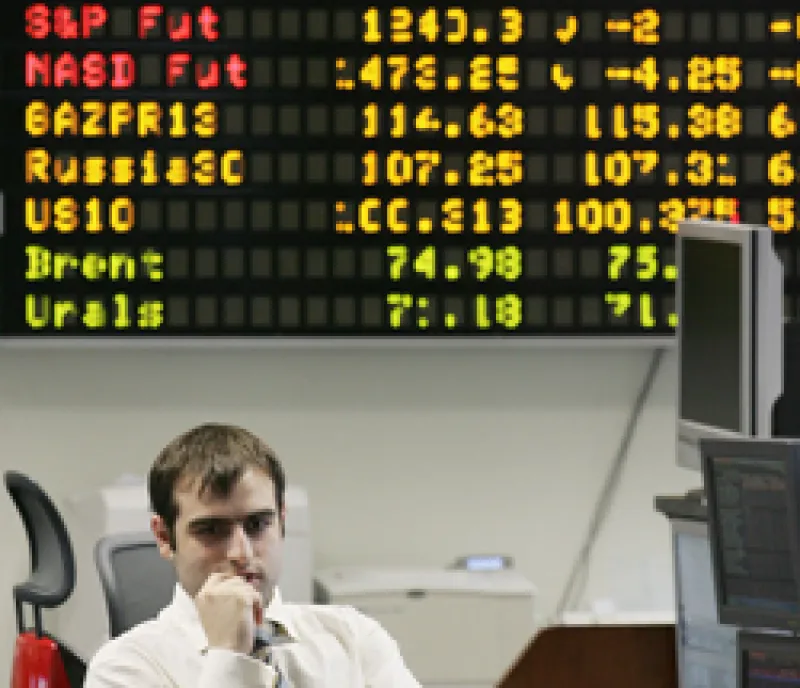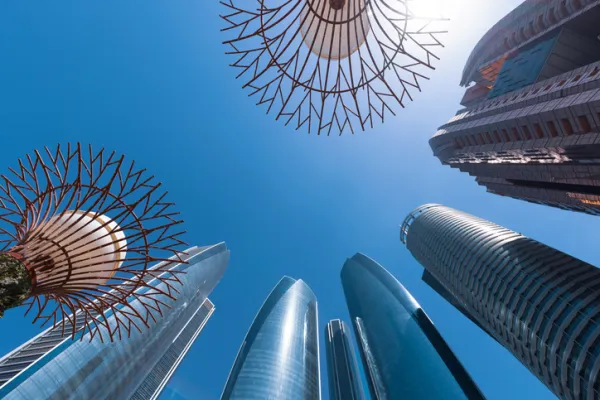Russia would be a buyer’s market, many analysts and market observers believe, but insufficient reporting and disclosure — coupled with an uncertain political environment ahead of parliamentary and presidential elections — have been scaring off investors. Plunging commodities prices, a strengthening dollar and lingering jitters about the viability of the global economic recovery have also taken a toll on investor confidence — and Russian stocks.
[See the complete listing of the 2011 All-Russia Research Team.]
“The market is underpricing Russian equities relative to their intrinsic value because of corporate governance worries and general uncertainty,” explains Alexey Zabotkin, global head of strategy at VTB Capital. “A lot of money is leaving the country. Capital outflows were at $20 billion in the first quarter and are likely to continue.”
The situation has been deteriorating rapidly. In early March the benchmark Russian Trading System index broke through the psychologically important 2,000-point mark for the first time since July 2008 — before the collapse of Lehman Brothers Holdings in the U.S. sparked the greatest financial crisis since the Great Depression — and was up 14 percent year-to-date. Within weeks, however, the price of Russia’s most important commodity, oil, began to slide. It sank 15 percent, from $113.52 to $96.46 a barrel, in the first two weeks of last month alone — and dragged the RTS index down with it. By mid-May the index had tumbled to 1,846.32, resulting in a year-to-date gain of only 4.3 percent. (During the same period the Standard & Poor’s 500 index advanced 5.7 percent.)
Such volatility only underscores an image of Russian instability — but that impression often stands in stark contrast to the corporate reality, according to Troika Dialog chief economist Evgeny Gavrilenkov. “Growth is being delivered by established companies with gains in productivity,” he says.
Investors can find it hard to focus on stable growth, however, when a market gives up gains of 10 percentage points in a matter of weeks. Money managers depend on guidance from informed analysts to help them keep short-term volatility in perspective and create portfolios that are likely to withstand such nerve-wracking market gyrations, and they say no firm does a better job of providing that guidance than VTB Capital, which leads the 2011 All-Russia Research Team, Institutional Investor’s eighth annual ranking of the country’s top equity and fixed-income researchers.
VTB Capital leaps from fourth place to finish on top for the first time, with 14 positions — eight more than in 2010. Troika Dialog, which tied for first place last year, ranks second; the firm captures 12 spots, one fewer than last year. Despite picking up two more positions, for a total of nine, Deutsche Bank holds steady in third place, for a third year running. Renaissance Capital, which led or co-led the team for the past seven years, tumbles to No. 4 after losing eight positions, leaving it with five. Three firms — Credit Suisse, J.P. Morgan and UralSib Capital — tie for fifth place; they claim two spots each. The complete list of winning firms can be found on our web site, institutionalinvestor.com, as can the full roster of ranked analysts; the No. 1 researcher in each sector can be found in the table to the right.
Investor emphasis on corporate governance isn’t rooted in a decline in disclosure — Russia has long lagged other markets insofar as governance is concerned, but investors didn’t seem to mind before the crisis when the RTS index was posting double-digit gains each year — but rather is a reaction to the global meltdown. “Postcrisis, people are much more demanding. They want in-depth analysis,” says Alexey Yakovitsky, VTB Capital’s head of research. “They’re concerned about execution risk and corporate governance. Previously, there was not a lot of risk aversion, but people burned their fingers during the crisis on different kinds of investments worldwide. Now we’re in a different world.”
The bank has been adapting to this changing landscape by expanding its research operations, Yakovitsky says. VTB Capital added nine analysts over the past year, bringing its total to 40, and boosted stock coverage from 67 companies to 102. The firm picked up four analysts from rival RenCap in September, including Petr Grishin, who finishes in first place in Corporate Debt, and Nikolay Podguzov, who tops the roster in Fixed-Income Strategy.
These hires are the latest expansionary moves that VTB Capital, which was founded just three years ago, has undertaken to establish itself as the top investment bank in Russia. “The challenge has been to build something completely from scratch,” says Yakovitsky, who was one of a dozen Deutsche Bank analysts to join the firm in 2008. “Absolutely everyone here is focused on beating the competition and being No. 1.”
VTB Capital has been able to entice analysts from other firms thanks to its deep pockets — its parent company, Moscow’s VTB Group, is majority-owned by the state, which began to privatize the institution in 2007 and raised some $8 billion in an initial public offering. In February the government raised an additional $3.3 billion through a secondary offering that reduced its stake to 77.5 percent.
However, rival Troika may soon give VTB a run for its money. In March, Russia’s largest financial institution, Sberbank, announced plans to buy Troika for $1 billion; a binding agreement is expected to be signed in the fourth quarter.
“If things go according to plan, it’s a great opportunity,” says Paolo Zaniboni, the firm’s London-based head of research. “We’ll carry on with what we’re doing, and we expect our platform will be enhanced by Sberbank’s balance sheet and greater number of corporate relationships.” Troika employs 28 analysts who track 141 stocks; those numbers are essentially unchanged from one year ago.
Deutsche Bank maintained its analyst head count at ten but added coverage of eight stocks, for a total of 85, according to Yaroslav Lissovolik, chief Russia economist and head of Russian company research. He plans to add analysts this year in light of dramatic growth in construction and infrastructure spending, especially in the wake of Russia’s successful bids for the 2014 Winter Olympics, to be held in Sochi, and the 2018 FIFA World Cup tournament. However, finding those analysts won’t be easy. “We see the local houses aggressively expanding,” Lissovolik says. “The challenge to add and retain talent is building.”
RenCap would likely agree. It has 18 analysts, down from 27 at this time last year. “We think it’s a compliment that they want us,” says David Nangle, who was named head of research following the December departure of Roland Nash, who left to join hedge fund firm Verno Capital. “When you’re looking for the best people, you’ll find them at Renaissance.”
RenCap has already taken steps to replace the analysts who left — and to add even more, Nangle says. Joining the firm this month are Ivan Tchakarov, formerly of BofA Merrill Lynch Global Research, who will be chief economist for Russia; Vladlen Andryushchenko, who left Dresdner Kleinwort in 2009 and will serve as director of fixed-income research; and Daniel Barcelo, formerly of Moore Capital Management, who will be global head of Oil & Gas research. In addition, RenCap plans to add analysts to cover the construction, infrastructure and transportation industries, among others, for a total of 34 analysts by year-end.
“We have every intention of being the No. 1 research house in Russia,” Nangle says. “Research is the core to everything we do at Renaissance. It’s what we live and die by.”
Nangle’s new responsibilities as RenCap’s head of research apparently haven’t diminished his ability to cover Financial Services; for a fifth consecutive year, money managers say he is the best at covering that sector. Nangle broke with the consensus in January 2010 by upgrading the global depositary receipts of VTB Group to buy, at $4.72, despite the fact that the bank had just posted its sixth consecutive quarterly net loss — including a deficit of nearly 60 billion rubles ($2 billion) in 2009 — largely because of bad loans.
He told clients that VTB was poised to outperform the market in the postcrisis recovery as Russia’s economy improved, thus enabling more borrowers to repay, and that newly appointed chief financial officer Herbert Moos, a 14-year veteran of Lehman Brothers, would lead the institution back to profitability. Nangle was right: In September the bank announced a record net profit for the first half of 2010 of R25.1 billion, compared with a loss of R31.5 billion over the same period one year earlier. The GDRs surged 40.9 percent, to $6.65, and outperformed the broad market by 33.5 percentage points through late November, when he advised investors to take profits, on the belief that the government would raise money to cover its budget deficit by reducing its stake in the company, thus putting downward pressure on the price of its financial instruments. Right again: In January the bank announced that 10 percent of the government’s stake would be put up for sale. In February, after the GDRs had slipped 5.7 percent, to $6.27, Nangle issued a valuation-based upgrade to buy. By the end of April, they had rebounded 3.2 percent, to $6.47.
Although investor interest in VTB’s secondary offering was far less enthusiastic than that which accompanied its IPO, at least the sale took place. Many Russian companies that had planned to go public in the first quarter — including mobile telephone retailer Euroset Holding, iron and coking-coal processor Koks Group and precious-metals mining concern Nord Gold — ended up canceling, owing to apprehension about market volatility and political uncertainty. A rare public rift between Russian President Dmitry Medvedev, widely perceived as reform-minded and pro-Western, and the more internally focused Prime Minister Vladimir Putin has fueled speculation that the latter may seek to return as president next March — and bring back an era in which government connections take precedence over corporate governance.
However, VTB Capital’s Zabotkin, who claims the top spot in Equity Strategy, takes it as a positive sign that the issuers chose to retreat rather than settle for lower stock prices. Zabotkin believes that some Russian stocks are undervalued by as much as 40 percent.
The challenge is to determine which stocks are not only bargain priced but also likely to increase in value. In the all-important Oil & Gas sector, Oleg Maximov is the best in the business, money managers say; the Troika Dialog analyst wins the top spot for a third straight year.
Russia is the world’s largest exporter of oil, but that status can be a double-edged sword. When oil prices are high, the country rakes in the cash; when prices are low Russia’s economy stumbles. In addition, soaring worldwide demand for oil has resulted in shortages at home.
Given how much is at stake, it’s not surprising that government intervention is more prevalent in this sector than in any other. Last winter the Kremlin imposed a cap on gasoline prices in an attempt to curb inflation, and last month it raised duties on oil products by 44 percent, to slow the pace of exports. The burden of regulation and taxation not only constrains the returns investors can capture, Maximov says, but also puts a crimp in the industry’s willingness to invest in exploration and production.
“There’s no doubt that reserves are there below ground,” he says, “but above ground the factors are tricky.”
Instead, Maximov has been steering investors toward natural-gas companies, which are far more lightly regulated and taxed. In January 2010 the analyst urged clients to buy the GDRs of NovaTek, making the case that the independent natural-gas producer, which is headquartered in the Yamalo-Nenets Autonomous Region, would continue to take domestic market share away from state-run Gazprom. He also believed that NovaTek’s stock was “unfairly beaten down” and “underappreciated” by investors. No doubt they appreciate it now: The stock catapulted 99.3 percent, from $70.50 to $140.50, through April 2011.
Another area where bargains abound is Metals & Mining, according to Dmitry Kolomytsyn, who leaps from runner-up to finish in the winner’s circle for the first time. In June 2010 the Morgan Stanley analyst upgraded Norilsk Nickel from neutral to overweight, at $159.50, noting that the Moscow-based producer of nickel and palladium was trading at a 42 percent discount on its price-earnings ratio relative to its global peers despite surging demand for precious metals. In January, after the stock had shot up 56.4 percent, to $249.50, and outpaced the broad market by 23.9 percentage points, Kolomytsyn downgraded them back to neutral, on valuation. The shares continued to rise, however, advancing a further 10.2 percent — 3.6 points better than the market — through April.
Commodities prices will continue to fluctuate, notes Troika’s Gavrilenkov, who is No. 1 in Economics for a fourth year running, but that volatility shouldn’t distract investors from the other opportunities that Russia has to offer. “Russia’s economic growth is driven by domestic demand,” which remains strong, he adds. The hard part is figuring out which companies will grow despite the volatility — and the members of the 2011 All-Russia Research Team have already demonstrated that they are up to the task.






